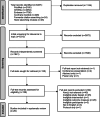Educational Interventions to Develop and Enhance Clinical Documentation Skills in Health Professional Students: A Systematic Review
- PMID: 40755057
- PMCID: PMC12319399
- DOI: 10.1111/tct.70157
Educational Interventions to Develop and Enhance Clinical Documentation Skills in Health Professional Students: A Systematic Review
Abstract
Background: Clinical documentation is necessary for effective and safe healthcare practice. This paper systematically reviewed educational interventions aimed at developing entry-level health professional students' clinical documentation skills.
Methods: A systematic search of electronic databases (PubMed, CINAHL, Embase and Cochrane) from January 2000 to May 2023 was performed, with additional forward and backward citation searching. Inclusion was limited to original manuscripts published in English from January 2000, reporting an experimental or quasi-experimental design and using objective performance-based measures. Quality appraisal was conducted using the Medical Education Research Study Quality Instrument (MERSQI), with narrative synthesis of results due to the heterogeneity of outcome measures.
Results: Of 5313 records identified, 29 studies were eligible for inclusion. The health professions represented were medicine, dentistry, nursing, pharmacy, psychology and veterinary science. Teaching methodologies included the following: didactic instruction; provision of templates, guidelines and/or examples; instructor-led group discussion; individual or group instructor feedback; near-peer or peer feedback; self-evaluation; writing practice activities; worked examples; and response-to-stimulus writing activities (written, video or live standardised patient cases). Research quality was low in MERSQI domains of 'study design' and 'validity of evaluation instruments'.
Conclusion: Several training methods appear valuable in developing student skills in clinical documentation; however, high-quality evaluation of documentation training interventions is lacking. Future research is recommended to compare existing methods of documentation training and to evaluate training in underexplored healthcare disciplines.
Keywords: clinical documentation; education; health professional; students; training; written communication.
© 2025 The Author(s). The Clinical Teacher published by Association for the Study of Medical Education and John Wiley & Sons Ltd.
Conflict of interest statement
The authors declare no conflicts of interest.
Figures
Similar articles
-
The educational effects of portfolios on undergraduate student learning: a Best Evidence Medical Education (BEME) systematic review. BEME Guide No. 11.Med Teach. 2009 Apr;31(4):282-98. doi: 10.1080/01421590902889897. Med Teach. 2009. PMID: 19404891
-
The effectiveness of using non-traditional teaching methods to prepare student health care professionals for the delivery of mental state examination: a systematic review.JBI Database System Rev Implement Rep. 2015 Aug 14;13(7):177-212. doi: 10.11124/jbisrir-2015-2263. JBI Database System Rev Implement Rep. 2015. PMID: 26455855
-
Whether case-based teaching combined with the flipped classroom is more valuable than traditional lecture-based teaching methods in clinical medical education: a systematic review and meta-analysis.BMC Med Educ. 2025 Jul 1;25(1):906. doi: 10.1186/s12909-025-07465-4. BMC Med Educ. 2025. PMID: 40598010 Free PMC article.
-
The measurement of collaboration within healthcare settings: a systematic review of measurement properties of instruments.JBI Database System Rev Implement Rep. 2016 Apr;14(4):138-97. doi: 10.11124/JBISRIR-2016-2159. JBI Database System Rev Implement Rep. 2016. PMID: 27532315
-
Health professionals' experience of teamwork education in acute hospital settings: a systematic review of qualitative literature.JBI Database System Rev Implement Rep. 2016 Apr;14(4):96-137. doi: 10.11124/JBISRIR-2016-1843. JBI Database System Rev Implement Rep. 2016. PMID: 27532314
References
Publication types
MeSH terms
Grants and funding
LinkOut - more resources
Full Text Sources


